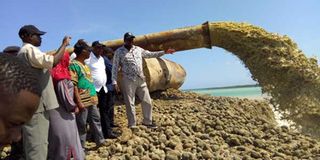Prompt Payment Bill a ray of hope to victims of compulsory acquisition

Infrastructure PS Paul Maringa, Lamu West MP Stanley Muthama (in white shirt) and Lapsset CEO Silvestre Kasuku observe a dredging machine at the site where the first three berths of Lapsset are being constructed at Kililana. PHOTO | KALUME KAZUNGU | NATION MEDIA GROUP
What you need to know:
- The Land Value (Amendment) Act came into force in 2019 with an objective of providing guidance on the process of compulsory acquisition of private or community lands for a public use.
- The Act introduced amendments which are not only potentially unconstitutional but also likely to infringe the property rights of communities where compulsory acquisition takes place.
- The Prompt Payment Bill, introduced into Parliament on February 28, 2020, will be a big win for many poor Kenyans and communities.
- Legislators must remember that Kenya’s democracy can only succeed when the interests of the people, especially the most vulnerable persons, are placed at the center of decision-making processes.
Laws are not always just. Ironically, the law can be used as a tool for creating social order and, at the same time, as an avenue for oppression. In many countries around the world, the law has been used to protect political and monetary interests at the expense of the most vulnerable in society.
In Kenya, this is demonstrated by the government’s enactment of draconian and backward legislation, such as the Land Value (Amendment) Act, which is, to a great extent, oppressive to the ordinary citizen.
The Land Value (Amendment) Act came into force in 2019. Its objective is to provide guidance on the process of compulsory acquisition of private or community lands for a public purpose. It also describes the method of calculating the value of land acquired in order to estimate the amount of compensation.
The Act introduced amendments which are not only potentially unconstitutional but also likely to infringe the property rights of communities where compulsory acquisition takes place. It allows the government to compulsorily acquire land and pay individuals or affected communities as late as one year later.
The positive changes made to the law through this amendment Act are insignificant. Instead, it has legalised the government’s usual tendency to acquire land illegally without compensating affected persons promptly.
To date, communities from Lamu County, including farmers in Kililana, Kwasasi, Sinambio, the Awer of Bargon and villagers from Bobo and Roka whose lands were acquired for the Lamu Port South Sudan Ethiopian Transport (Lapsset) corridor have not been compensated, even though the legal regime at the time of acquisition the government to compensate affected persons before possessing their land. Persons affected by the Standard Gauge Railway project, which the Court of Appeal recently declared illegal, are facing a similar predicament.
Failing to compensate these communities promptly has increased their vulnerability to human rights violations. This is particularly inevitable where communities are evicted from their ancestral lands, rendering them homeless and internally displaced years after the completion of these projects.
Perhaps the critical question to ask ourselves at this point is whose interests this law serves.
THE PROMPT PAYMENT BILL
To answer that question, let us draw our attention to the Prompt Payment Bill, introduced into Parliament on February 28, 2020 - just around the period when countries were going into lockdown due to the novel coronavirus pandemic.
The purpose of this Bill is to provide for the prompt payment for supply of goods, works and services procured by government entities at the national and county levels. This Bill, unlike the Land Value (Amendment) Act, places a mandatory obligation on the government to pay for goods, services or works provided within the date prescribed in a contract or, where no date is prescribed, within 90 days or less as prescribed by the Cabinet Secretary by way of delegated legislation. Failure to make a prompt payment attracts a criminal penalty and interest on the principal amount.
Arguably, just like any other commercial arrangement, compulsory land acquisition is a form of procurement. However, the difference in treatment between ordinary procurement transactions and compulsory land acquisition is glaring.
For instance, prompt payment in the context of the Act differs from the meaning it is given under the Bill. Similarly, the failure to pay for services in time attracts a criminal penalty under the Bill but not under the Act. Yet, in both instances, the government benefits in some way from the goods, services or rights acquired.
EQUAL TREATMENT
Community land is a valuable commodity for communities that depend on it for their livelihood. Its acquisition by the government must therefore be treated in the same way as other government procurement processes, specifically in terms of ensuring that:
- Prompt payment is made to communities whose land are acquired in the interest of the public;
- The acquiring entity deals fairly, justly and lawfully with the affected communities or individuals; and
- Communities have access to remedies where a violation occurs, including through the imposition of personal liability on the responsible entity and/or officer for failing to provide adequate and prompt compensation for the land acquired by the government and charging interests on amounts due where compensation is unduly delayed.
This is the only way to ensure that as a nation we protect the integrity of our laws.
Legislators must, therefore, remember that Kenya’s democracy can only succeed when the interests of the people, especially the most vulnerable persons, are placed at the centre of decision-making processes. This requires equal treatment of all people under the law.
Rose Birgen is an Advocate of the High Court of Kenya and a senior programme officer with Natural Justice.
Eva Maria Okoth is an Advocate of the High Court of Kenya and a programme officer with Natural Justice.




